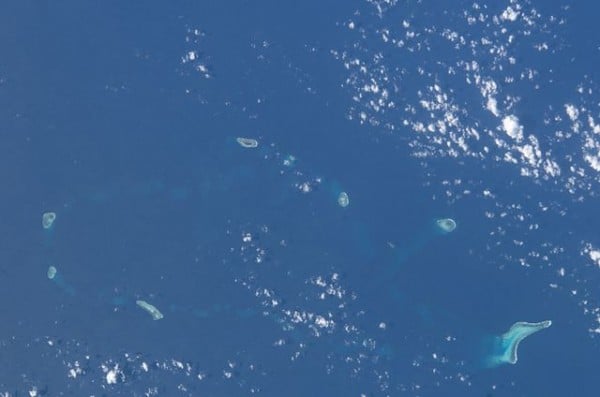
Photograph from the International Space Station of the South China Sea which includes the Eldad Reef and Itu Aba Island features. Photo Credit: Image Science and Analysis Laboratory, NASA-Johnson Space Center
The advent of the China-led Asian Infrastructure Investment Bank (AIIB) appears to be a sign of U.S. geopolitical decline, or at least of China’s geopolitical ambitions. France, the U.K., Australia and South Korea are among our allies who have signed up; the U.S. and Japan have been holding back. At the same time, the U.S.-led Trans-Pacific Partnership (TPP) trade pact, which does not include China and appears to be an attempt to check Chinese power, seems to be on track.
Should the U.S. allow geopolitical rivalry to subsume economic matters? Economically, our interdependence with China is deep and mutually beneficial; disrupting it will damage both sides, and both governments know this. While U.S. influence remains dominant, China’s is growing. Using economic policy to reinforce our position puts the economic benefits at risk and exacerbates tensions. As China grows in international economic clout, extending the rivalry could even drag our economy into the relative decline of our overall power. If we let geopolitics alienate us from a global source of economic strength, we also cast ourselves as more interested in our power than others’ economic growth.
To be sure, we must follow up on commitments made to date and implement TPP and its Atlantic counterpart, the Transatlantic Trade and Investment Principles pact (TTIP). Both liberalize trade, a good in itself, even if they are tied to geopolitical allegiances. Shoring up the latter is necessary right now, and dropping the ball on either pact would undermine U.S. credibility, both to our partners and to our commitment to liberalization.
The time has come to contemplate diplomatic foundations for a new global posture. The purpose of our geopolitics is to defend freedom, as we know it in our liberal democracy, and as understood by our closest allies. Our nationhood makes freedom our deepest strategic interest. Whether of containing Russia or China or Iran; of cementing economic power in trade or finance; or of enforcing human rights; policies must fit each other, and current realities, in a long-term orientation to that fundamental end.
Geopolitics and military security can be re-oriented, away from “containing X” (fill in Russia, China, Iran, ISIS, North Korea, or anyone else we dislike but prefer not to attack) toward “defending free society.” Established democracies, with a liberal ethos, largely comprise the memberships of our primary alliances, NATO, U.S.-Japan, and ANZUS. Knitting these into an integrated community, dedicated to protect precisely this vision of freedom, we can keep attacks of violence, malicious disruption, or external coercion, off the table as they are now. Our focus would be non-directional, responsive to any threat, and would hold not only our territories but our communications channels sacrosanct.
This group of nations has the technical capacity to deter any threat. The U.S. military is already orienting itself in that direction, toward a focus on the global commons. Diplomatic re-orientation of our alliances will align our military and geo-political strength with moral principle. Freedom will have a clear diplomatic base, on which we can orient further diplomacy to our best ends.
We should treat economic development as an influence for freedom. Those places where well-ordered democracy has taken root, or where rights are spreading, have seen freedom progress after economic growth. We should not condition our support of growth on such progress, but if a nation secures liberal values in its institutional practices, we should consider inviting it into our security alliance. Such a stance creates a mutual interest in developing nations’ intertwined growth and freedom.
Here, U.S. policy would assess other nations less as “friend or foe,” than as more or less compatible with our ends of freedom. The U.S. and China may well be inevitable rivals, as Robert Blackwill and Ashley Tellis assert in a recent Council of Foreign Relations report. But China might become a “three (or four or two) out of ten” rather than a “frenemy.” With a single criterion to guide us, we will be better able to avoid schizophrenia such as dissident Chen Guangcheng felt when his refuge in the U.S. Embassy collided with Hillary Clinton’s economics-oriented visit. In this stance, questions over China’s islands in the South China Sea can be viewed in terms of how they “move the needle” of compatibility rather than who wins or loses a zero sum confrontation. A security policy emphasis “for freedom” more than “against China” also maintains an overriding defense commitment to Japan while allowing us to treat an AIIB on purely economic grounds.
Above all, steering policy toward the protection of freedom and commitment to economic growth, and away from “anti-X” habits, will better orient our policy to our nature.